Seppie Furlano gets dirty at school. It happens. He’s 8, he’s a boy, and one day a week, his classroom is a mixture of trees, shrubs, dirt, and mud.
And there’s a creek.
Seppie and his classmates, who include his 10-year-old sister, Luciana, climb trees, discover tadpoles, and build small boats out of twigs and leaves to float down the creek.
Luciana’s mom reports that her daughter doesn’t get quite as dirty as her brother, but she has just as much fun. Together, they explore and learn about the great outdoors and all it has to offer at Curious and Kind, a nature-based, hybrid school located near their Sarasota home.
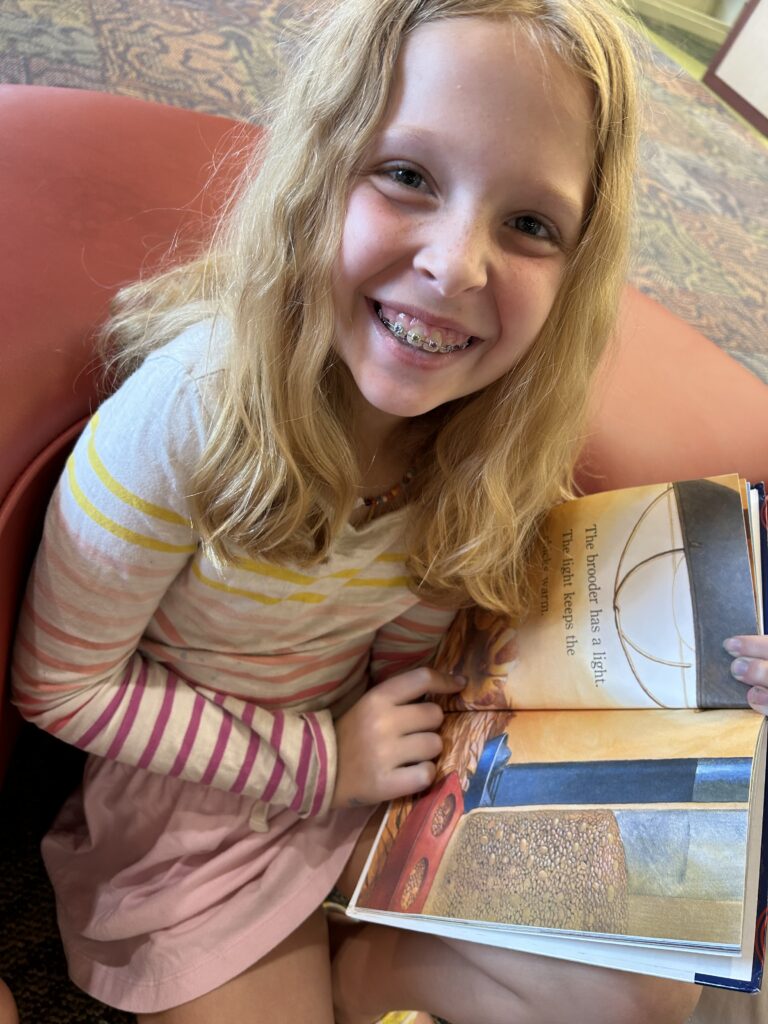
Luciana is dyslexic, but with the help of an online reading tutor available with her ESA, she is now able to read books.
The school, started two years ago by Justine Wilson and her husband, Chris Trammel, is now part of the hybrid learning, homeschool experience that Kristina and Dominic Furlano designed for their children with the help of education choice scholarships managed by Step Up For Students.
“I absolutely love the scholarship,” Kristina said. “The scholarship has made our homeschooling journey what it is today. My kids are absolutely thriving.”
Actually, Kristina balks a little at the word homeschooling, because Luciana and Seppie learn both inside and outside the home.
“I feel like that is the complete opposite of homeschooling,” she said.
The scholarships are education savings accounts (ESA) that allow the Furlano’s flexibility to tailor the homeschool curriculum toward each child’s needs and interests. They have joined the growing number of parents in Florida who are taking the hybrid route, finding educational environments outside the home to give their children something they can’t experience inside the home.
Parents are supplementing in-home learning by sending their children to educational environments that specialize in such activities as music, fashion, cooking, robotics, athletics, and nature. Call it “à la carte learning.”
Curious and Kind offers four different programs for different age groups, from “walking ages” to teenagers. Depending on the program, families can enroll what the school calls their “explorers” one, two, or three days a week. (Read more about the school here.)
“We are part of a homeschool family's menu that they designed specifically for their child,” Justine Wilson said.
Luciana takes sewing and musical theater classes, while Seppie attends a local STEM program that offers classes in Lego robotics. On Tuesdays, the two can be found at a local skate park with other homeschooled children. Some parents use skateboarding as a physical education requirement. Afternoons are often blocked out for reading tutors.
This summer, the two will participate in several camps, more outdoor fun at Curious and Kind, and a baking camp. If all goes well, baking camp will turn into baking classes during the 2025-26 school year. Kristina has already expanded her children’s outdoor learning for next year by enrolling them at Curious and Kind for two days a week.
“I like my kids to be out of the house, but only for a couple of days a week. I don't want them gone five days a week,” Kristina said. “If they are gone two or three times out of the week, it gives them some structure, and they get to make friends, and I get to do what I need to do while they're gone.”
Luciana originally attended a local private school. She is dyslexic, though, and that hindered her learning. She had to repeat the first grade. She also suffered from anxiety at school. So, Kristina and Dominic decided homeschooling was the best option.
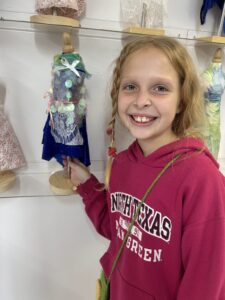 Because she is dyslexic, Luciana qualified for the Family Empowerment Scholarship for Students with Unique Abilities.
Because she is dyslexic, Luciana qualified for the Family Empowerment Scholarship for Students with Unique Abilities.
Because Seppie is homeschooled, he qualified for the Personalized Education Program (PEP) scholarship.
The flexibility of homeschooling allows Kristina to schedule online reading tutors for the afternoon, when she feels Luciana and Seppie are more receptive to video lessons. It works.
“My daughter read her very first book two weeks ago, so that was amazing,” Kristina said. “We were all so worried about this child, and then she read this book. She’s on her sixth book now. I mean, they're all the very beginner books, but she's got it, and she's putting it together, and it's just been really helpful to have the tutor.”
The ESAs pay for homeschool curriculum, reading tutors, a ton of art and sewing supplies, sewing and outdoor classes, musical theater, and summer camps.
Luciana has learned to sew by taking classes from a mother who also homeschools her children.
“Luciana is using a real sewing machine. She designs. She cuts the fabric out, picks her fabric, picks her string, and sews the entire thing,” Kristina said.
Luciana has made pajama pants, a skirt, a hat, bags, and sleeping masks.
“They do fashion shows,” Kristina said. “She has a little portfolio.”
Because of Luciana’s dyslexia, Kristina said a brick-and-mortar school will never be a good fit for her daughter. She has no intention of sending Seppie to one, either.
“The beauty of homeschooling is to not make your child have this cookie-cutter education that society wants your children to have,” Kristina said. “Now we have this generation of home-schooled children who are going to take over the world with their creativity. They're not going to work 9-to-5. They’re going to be entrepreneurs.”
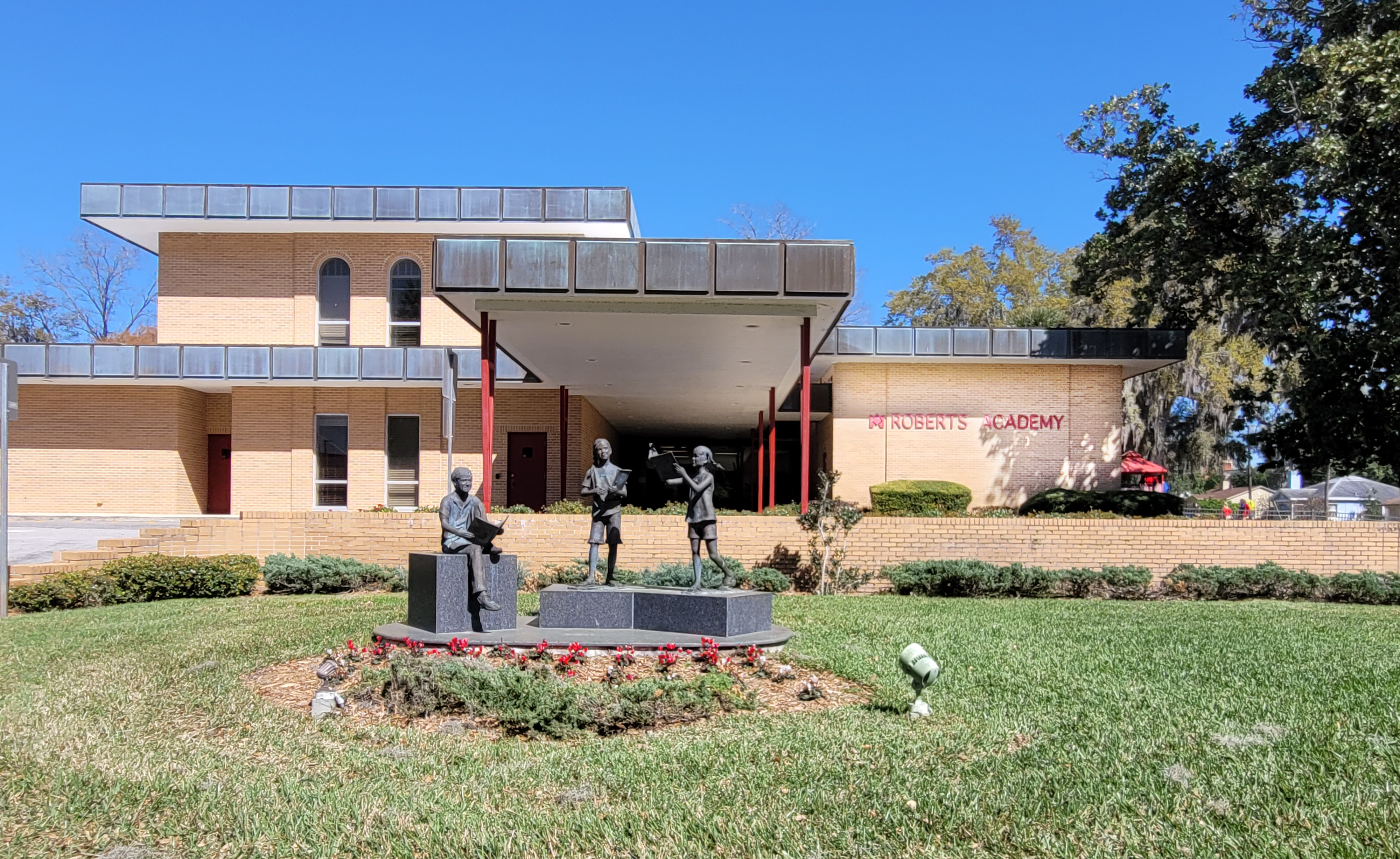 LAKELAND, Florida — The fifth graders listen intently as the teacher Alexandra Probasco slowly reads a sentence: “Tammy got in trouble for interjecting during class.”
LAKELAND, Florida — The fifth graders listen intently as the teacher Alexandra Probasco slowly reads a sentence: “Tammy got in trouble for interjecting during class.”
Their assignment: Decode the sentence, translating the sounds of the letters in the words their teacher says into writing on a page. Students tap out syllables with their fingers on the opposite arm. After repeating the sentence several times, along with a couple of gentle hints to think about the sounds in certain words, each student had successfully written out the sentence.

Teacher Alexandra Probasco visits each table as fifth graders work to decode and write a sentence she read aloud as a class assignment. " Mrs. Pro," as students like to call her, and the other teachers at The Roberts Academy receive extensive training in the Orton-Gillingham approach to teaching reading.
“Mrs. Pro,” as the students call Probasco, and the other teachers at this small private school in Lakeland use the Orton-Gillingham Approach to teach reading, writing and spelling. It relies on a multi-sensory approach and has been called the gold standard for students with dyslexia.
The Roberts Academy has used Orton-Gillingham since it opened in 2010. For a video detailing ho w the school uses the approach, go here.
Developed in the 1930s and 40s for students who had what was then called “word blindness,” Orton-Gillingham teachers use hearing, sight and movement, such as tapping out syllables. Students use phonics to decode words and memorize common spelling rules.
For example, the letter g can sound like j if it comes before an i, e or y, as in gem, giant, gym, but it says g before everything else, as in garden or glad. Those rules, along with corresponding hand signals used to teach them, can be seen in colorful classroom bulletin board displays. Roberts's teachers call words that don’t follow the rules “heart words,” which means students must learn them by heart. They even draw tiny hearts around them to help make the point.

Common spelling rules are always on display in Roberts Academy classrooms. Exceptions are called "heart words" because students must learn them by heart.
The approach is grounded in the “science of reading,” a term that refers to decades of research that point to effective strategies for teaching kids to read.
Parents of dyslexic students have been among the groups leading the push to use methods that systematically teach students to connect the sounds letters make to the words they see on the page. These methods are an essential component of effective reading instruction for all students, but they’re especially vital for students with dyslexia because the learning disability scrambles the connections readers make between words and sounds but can be overcome with the right support.
Private tutors trained in approaches such as Orton-Gillingham can cost $50 an hour. Many states, including Florida, passed legislation recently that bans discredited approaches and requires teachers to use phonics as the basis for reading instruction.
But the Roberts Academy has been ahead of the curve, which is a primary reason for its growth.
“We would love it if they’d build a high school,” said Cassie Ridgely, whose son, Chase, 12, started at Roberts in second grade shortly after being diagnosed with dyslexia. Before that, he had attended a private faith-based school. Though the teachers there offered extra help through a special program, he needed something more. . Now in fifth grade, Chase can read closer to grade level.
“It takes a lot of patience to work with these kids every day,” said Ridgely, who also likes that classes are limited to 12 students. ‘We have never had any issues if Chase needed extra help.”
Some families drive an hour and 15 minutes one way from Windermere near Orlando, so their kids can attend the school, which accepts the Florida Family Empowerment Scholarship for students with Unique Abilities.
Parents offer heartfelt testimonials about how their children no longer hate school now that they realize they can learn. One dad talked about how his daughter, who used to memorize storybooks but couldn’t read any individual words in them, started reading restaurant menus after switching to the Roberts Academy.
That confidence can be witnessed in a classroom where teacher Brittany Longbottom helps her fourth graders learn words by pronouncing them, sounding out the letters and writing them.
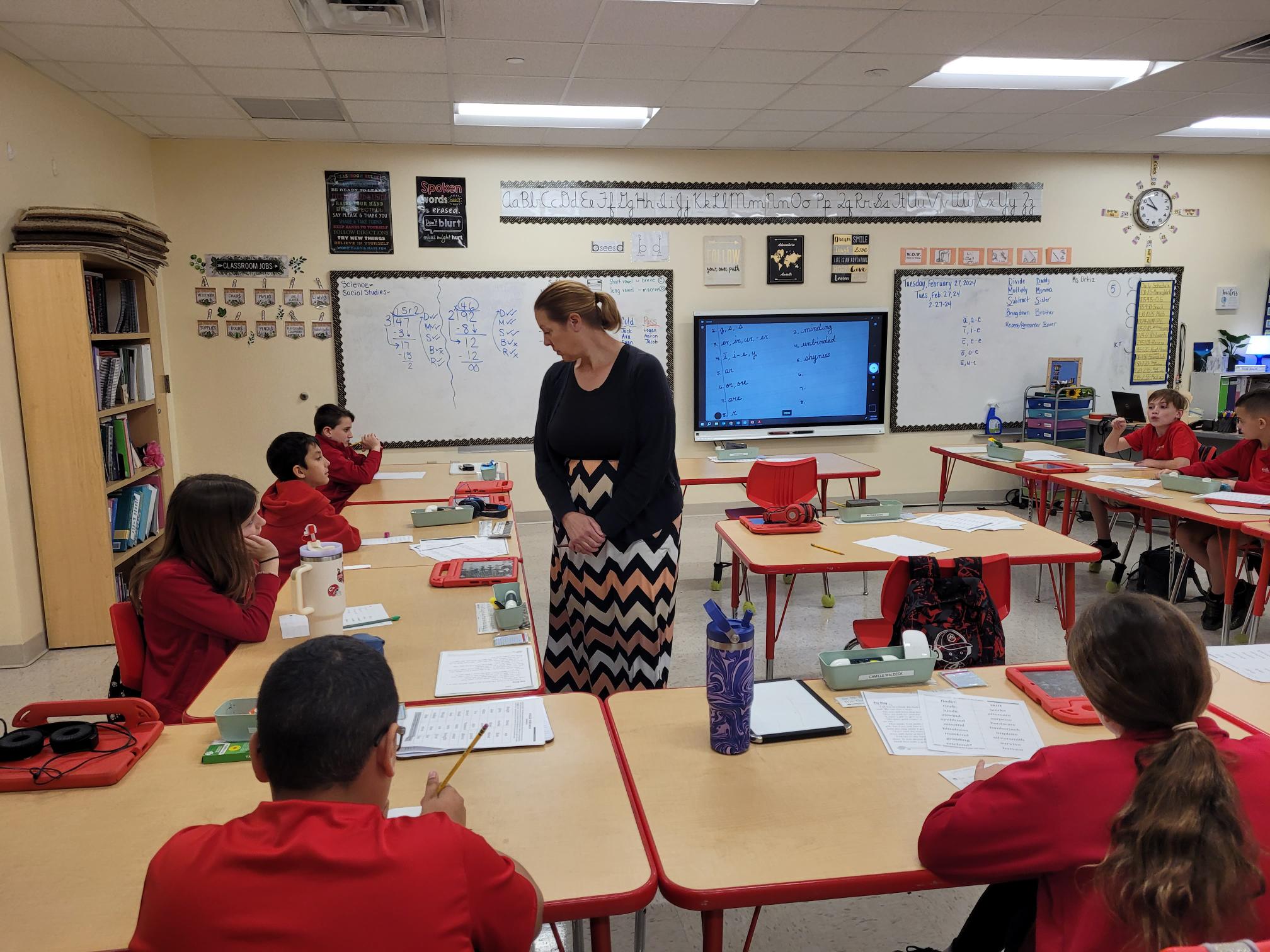
Fourth grade teacher Brittany Longbottom looks over her students' work as they attempt to spell words.
“Charm-er,” she says, careful to separate the syllables as uses her hand to tap them on her other arm. The students do the same and then write the word on their papers.
The next word, “termites,” is a bit trickier. After tapping to help them break down the syllables, Longbottom reminds them of the silent-e rule that governs vowel sounds of words ending in e as the students write the word. According to the rule, the e at the end of the word isn’t pronounced but gives the vowel in that syllable a long sound, or makes it say its name.
“Good job,” she says after they write the word on their papers.
Nestled on the campus of Florida Southern College campus amid buildings designed by Frank Lloyd Wright, the private school owes its existence to Marjorie and Hal Roberts, Lakeland philanthropists who donated $3.5 million to start the school when several their grandchildren thrived at the Schenck School, a private school in metro Atlanta known as a national leader among schools that focus on students with dyslexia. They described the school as a “transitional school” that students could attend until they had acquired the skills they needed to return to regular school.
“They thought Lakeland needed a school like that,” said head of school Kim Kelley, a former public elementary school teacher who joined the Roberts faculty after her nephew enrolled in 2011. While working at Roberts, she earned her master’s and doctoral degrees in education from Florida Southern. The school enjoys a partnership with the college, which sends its teacher prep students through a rotation at the school and offers a course in Orton-Gillingham. One first-year Florida Southern student, Saylor Kirkpatrick, is a Roberts Academy graduate who plans to major in elementary education.
The Roberts Academy initially served students in second through sixth grade. It added a second building in 2020 after phasing in seventh and eighth grades in 2017.
Earlier this year, Roberts cut the ribbon on a new 22,000-square-foot two-story addition that includes a state-of-the-art mathematics and science/computer labs, a cafeteria, gym with a rock-climbing wall, a large patio area designed for outside reading, writing, and collaborative study, nine new classrooms, and additional office space. Next school year, the school will add a first grade.
Kirkpatrick was among the speakers at the dedication ceremony. "I am not saying that learning becomes easier for students with disabilities like me, but I am rather saying having the right people working with your children can and will make it possible,” she said.
The Roberts’s have not limited their generosity to their former Florida hometown. A second school with the same name is slated to open in August on the campus of Mercer University in Macon, Georgia. Like the original school, the new campus will limit class sizes to 12 students. It will partner with the university’s college of education.
“Having experienced our grandchildren’s early struggles and their later achievements, and those of hundreds of children at the Academy in Lakeland, we feel compelled to help others accomplish the same success,” Hal Roberts said when Mercer officials announced plan for the new school. “We have experienced parents in tears of frustration and been with them two weeks later as they were thrilled over their child’s immediate acceptance by children with the same challenges and their early progress in school.”
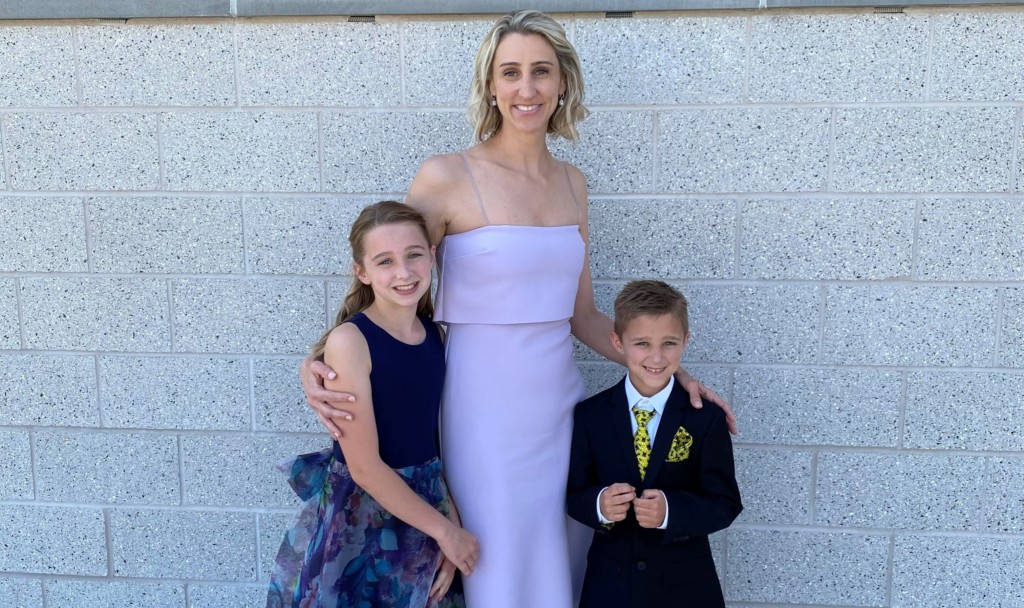
On this episode, reimaginED senior writer Lisa Buie talks with Shannon Bloodworth, a parent and education choice advocate from Archer, a small community 15 miles southwest of Gainesville, Florida. Her daughter, Ella, 11, and son, Holton, 7, receive the Family Empowerment Scholarship for students with Unique Abilities.
Bloodworth discusses her daughter’s medical condition and the challenge it created for her at her district school. She recounts the difficulties she had getting the school district to work with her on creating an individualized education plan, or IEP, eventually forcing her to consult a disability rights attorney. Once Bloodworth secured the IEP, she applied for and was awarded a McKay Scholarship, which at the time was the only state scholarship option for students with dyslexia.
“It’s made me very passionate and a warrior for other parents. You don’t know what you don’t know, and it’s a very lonely road.”
EPISODE DETAILS:
There's a growing recognition among educators and lawmakers that some students need learning environments tailored to their individual needs.
Case in point: A bill filed yesterday would create new schools of choice aimed at children with dyslexia.
The legislation by Jacksonville-area Sen. Aaron Bean would expand Duval County's GRASP program, and create similar institutions in five other school districts.
The K-8 schools would have small classes, curriculum especially tailored to dyslexic students, and mentoring support from the Duval school district, which started a standalone program this school year, as the Florida Times-Union reported. (more…)
by Allison Hertog
Mississippi recently became the first state in the nation to adopt a public and private school choice program in which state and federal monies are provided directly to schools which parents choose. Aimed at students with dyslexia, it's also the second special needs school choice program in the country designed for children with a single type of disability. (Ohio’s Autism Scholarship Program enacted in 2003 was the first.)
What makes this new program interesting is that it may be a starting point for other state legislatures where special needs voucher bills have failed due to concerns about parent accountability – Wisconsin comes to mind – or where special needs voucher laws have come under increased scrutiny due to reports of private school abuse of public money – Florida comes to mind.
Mississippi’s program morphed from a dyslexia screening and treatment bill (supported by a governor who struggled with the learning disorder) into a school choice measure during the proverbial sausage-making legislative process. It’s not as carefully or as broadly designed as it could have been. It also appears there’s currently only one school in the state which is specialized enough to meet the exceedingly specific criteria to participate. But nonetheless, it succeeds in incentivizing the growth of more highly-accountable school options for parents. (more…)